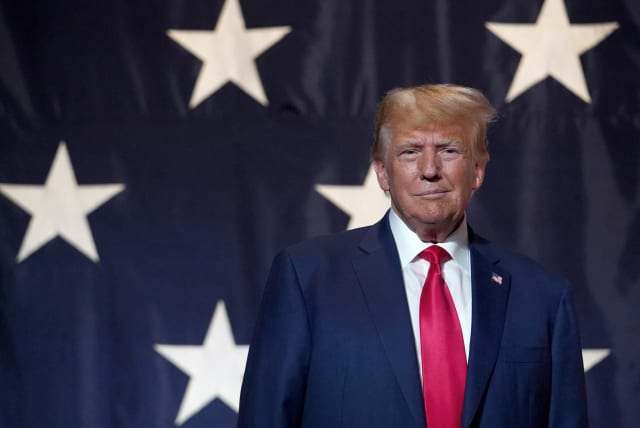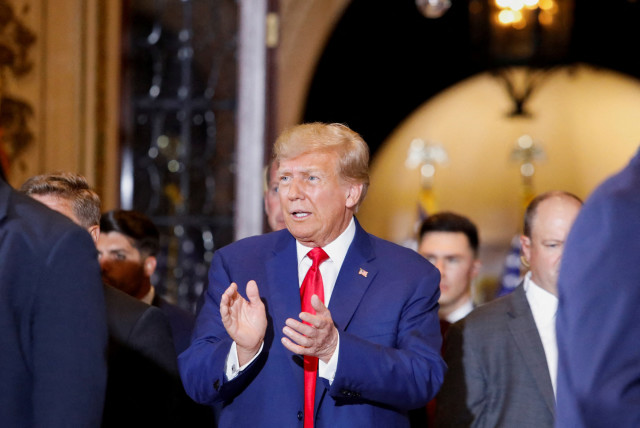Indicting Trump did not harm US democracy, raise support for violence - poll

The positive results of this survey not only show that US democracy is more resilient than previously believed, but that there is no danger in holding politicians accountable.
Indicting former US president Donald Trump for numerous criminal charges has not actually caused any damage to US democracy, new research suggests.
The study, conducted by the Polarization Research Lab, examined if the indictments facing Trump caused a surge of support for violations of the norms of democracy or political violence.
The positive results of this survey not only show that US democracy is more resilient than previously believed, but that there is no danger in holding politicians accountable.
Findings trump Trump: US political attitudes unchanged post-indictment
Trump was indicted for several different charges over the course of 2023. These include charges related to paying hush money to pornstar Stormy Daniels and illegally being in possession of several classified documents.
At the time, there were some who feared that this could lead to further inflammation of the tense and highly polarized state in the US.
But were these fears justified? Did support for anti-democratic actions and political violence surge after the former US president was indicted and slapped with criminal charges?
To figure this out, the researchers at the Polarization Research Lab began to investigate.
First, it is important to note what the study considered to be a democratic norm and what would constitute violating them.
They narrowed it down to the five following and asked the participants depending on their political affiliation, with the term "inparty" being which party the participants supported and "outparty" being the one they didn't support:
- Reduce outparty polling stations: Should the inparty reduce the number of polling stations set up in areas that typically vote for an outparty?
- More loyal to party than election rules and the US Constitution: If an inparty candidate questions the outcome of an election, should the rest of the party side with the candidate over the election rules and the US Constitution?
- Ignore outparty court decisions: Should inparty elected officials consider ignoring court orders when the judges behind them were appointed by outparty presidents?
- President should circumvent Congress: If an inparty president can't get cooperation from outparty Congressmen to pass new laws, should the president just issue executive orders to make the laws happen regardless?
- Censor partisan media: Should the government be able to censor media sources that spend more time attacking the inparty than the outparty?
Participants were also asked questions relating to political violence, such as assaulting outparty members.
These questions were asked of 29,725 people, all of whom identified as either Democrat or Republican. The test was also done in such a way both before and after the indictment in order to observe any possible changes in political leanings.
For example, regarding political violence, only 3% of both Republicans and Democrats supported assaulting a member of an outparty.
Regarding violating diplomatic norms, there was a very small increase among Republicans immediately after the indictment. However, this quickly returned to baseline just a week later, and it also never rose higher than support for democratic norm violations among Democrats.
This is also true for feelings of polarization and negativity between party lines. There was a small uptick in polarization among Republicans after the indictment, but it quickly fell back to normal soon after.
Overall, the study concluded that any actual changes to American political polarization and attitudes towards political violence and violating democratic norms were both minimal and fleeting. As such, it seems likely that trying to prosecute politicians for their actions won't cause any major changes among the US public.
Jerusalem Post Store
`; document.getElementById("linkPremium").innerHTML = cont; var divWithLink = document.getElementById("premium-link"); if (divWithLink !== null && divWithLink !== 'undefined') { divWithLink.style.border = "solid 1px #cb0f3e"; divWithLink.style.textAlign = "center"; divWithLink.style.marginBottom = "15px"; divWithLink.style.marginTop = "15px"; divWithLink.style.width = "100%"; divWithLink.style.backgroundColor = "#122952"; divWithLink.style.color = "#ffffff"; divWithLink.style.lineHeight = "1.5"; } } (function (v, i) { });

